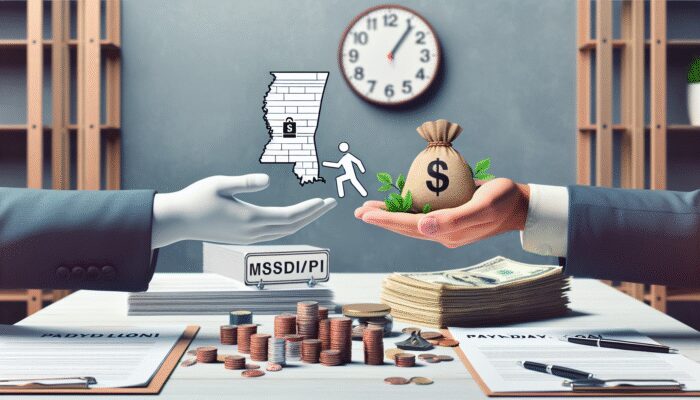Key Points to Remember
Here are essential points regarding payday loans and assistance in Mississippi.
- Definition: Payday loans are short-term, high-interest loans due on the next payday, often leading to a cycle of debt.
- Resources: Mississippi offers various local organizations providing assistance, including financial counseling and emergency funds.
- Verification: It’s crucial to confirm the legitimacy of assistance programs to avoid scams.
- Community Support: Engaging with community organizations can provide essential resources for managing payday loan challenges.
Understanding Payday Loan Assistance in Mississippi
Payday loan assistance is available through various local resources in Mississippi.

What Are Payday Loans?
Payday loans are short-term, high-interest loans that can become a financial lifeline for individuals who find themselves in urgent need of cash. Typically due on the borrower’s next payday, these loans are intended to cover immediate expenses but often lead to a cycle of debt due to their high-interest rates. Common reasons for taking out payday loans include:
- Unexpected medical expenses
- Car repairs
- Utility bills
- Emergency home repairs
- Grocery bills
- Debt consolidation
- Travel costs
- Education expenses
While they may offer quick access to funds, the terms can be predatory, leading borrowers into deeper financial distress. Understanding this landscape is crucial for those in Mississippi looking for assistance.
Local Resources for Payday Loan Help
Mississippi provides various resources for individuals who find themselves overwhelmed by payday loans. These resources often include nonprofit organizations and government programs that assist borrowers with counseling, negotiation services, and financial education. Key organizations in Mississippi that offer assistance include:
- Mississippi Center for Justice
- Consumer Credit Counseling Service of Mississippi
- United Way of the Capital Area
- Operation Hope
- Local credit counseling agencies
- Mississippi Department of Human Services
- Community action agencies
- Local churches and charitable organizations
These organizations not only provide financial relief but also teach individuals how to manage their finances effectively, helping to break the cycle of payday loan dependency.
How to Identify Legitimate Assistance Programs?

When searching for help with payday loans, verifying the legitimacy of assistance programs is paramount to avoid scams. Legitimate programs typically possess accreditation and positive reviews from previous users. To ensure that you are accessing a trustworthy assistance program, consider the following verification steps:
- Check for accreditation from recognized organizations
- Read user testimonials and reviews
- Verify the program’s registration with the state
- Look for transparency in fees and services offered
- Consult with local financial experts or advisors
- Research the organization’s history and mission
- Ask for referrals from trusted sources
- Attend introductory sessions to gauge professionalism
By taking these steps, you can safeguard yourself against fraudulent programs that prey on vulnerable individuals seeking financial help.
Legal Regulations and Consumer Rights in Mississippi
Understanding the legal framework surrounding payday loans in Mississippi can empower borrowers to make informed decisions. Mississippi has specific laws governing these loans, including limits on loan amounts and interest rates. Key regulations include:
- The maximum loan amount is generally limited to $500
- Interest rates can be as high as 572% APR
- Borrowers are entitled to a 30-day repayment period
- Loans can be rolled over, but this incurs additional fees
- Lenders must provide clear disclosure of terms
- Borrowers have the right to access their financial history
- Consumer protection agencies oversee compliance
- Predatory lending practices are prohibited
Being aware of these regulations can enhance your position when negotiating terms with lenders or seeking assistance.
Expert Insights on How to Find Local Mississippi Resources for Payday Loan Help
Experts can provide valuable assistance in navigating payday loan challenges.
How Can Experts Help with Payday Loan Issues?

Experts in financial counseling play a pivotal role in assisting individuals with payday loan issues. They can provide tailored advice and strategies that help manage and eventually overcome payday loan debt. These professionals often offer insights into negotiation tactics and alternative financial solutions that can stabilize an individual’s financial situation. Some actionable steps that experts recommend include:
- Assessing your overall financial situation
- Creating a budget that prioritizes essential expenses
- Identifying all outstanding debts and their interest rates
- Negotiating payment terms with lenders
- Exploring alternatives to payday loans, such as credit unions
- Engaging in credit counseling services
- Setting up a savings plan for future emergencies
- Regularly reviewing and adjusting your financial plan
By implementing these strategies, individuals can create a roadmap toward financial stability and significantly mitigate the impact of payday loans.
What Are the Success Rates of Expert Interventions?
The success rates for expert interventions in payday loan assistance can vary widely. However, many individuals who work with financial professionals report significant relief and improved financial stability. Factors contributing to the rate of success include the individual’s commitment to following advice and the availability of resources tailored to their unique situations. For instance, studies suggest that:
- Over 70% of clients experience reduced debt
- Many individuals report improved credit scores within a year
- Regular financial check-ins lead to better outcomes
- Access to ongoing education is crucial for long-term success
- Clients often find alternatives to payday loans
- Successful negotiation outcomes can reduce overall debt burden
- Community support enhances the effectiveness of interventions
- Long-term follow-up significantly increases recovery rates
Thus, engaging with trained professionals can have a profound impact, making it essential for those struggling with payday loans to seek expert guidance.
Where to Find Expert Assistance in Mississippi?
Mississippi is home to several locations that provide access to expert assistance for payday loan issues. These include financial counseling centers and legal aid offices that specialize in consumer finance. Real-world examples of successful interventions in Mississippi demonstrate the efficacy of these resources. For instance:
- The Mississippi Center for Justice offers free legal services to those facing payday loan issues.
- Consumer Credit Counseling Service has helped hundreds negotiate lower payments.
- Local universities often have financial planning departments that provide free consultations.
- Community centers in urban areas host financial literacy workshops.
- Nonprofit organizations often partner with local banks to offer financial education.
- Legal aid offices help clients understand their rights and options.
- Local churches provide financial assistance and referrals.
- Credit unions offer low-interest loans as alternatives to payday loans.
Utilizing these resources can significantly enhance the likelihood of overcoming payday loan challenges in Mississippi.
How Do Payday Loan Assistance Programs Work?
Payday loan assistance programs aim to help borrowers regain financial control.
What Services Do These Programs Offer?
Payday loan assistance programs in Mississippi offer a variety of services designed to help individuals regain control of their finances. These services may include debt consolidation, negotiation with lenders, and financial education, which are all crucial elements in breaking the cycle of debt. Common services typically offered by these programs include:
- Debt management planning to create a feasible repayment strategy
- Negotiation services that work directly with lenders
- Financial literacy workshops to educate borrowers
- Access to emergency funds for urgent needs
- Support groups for individuals facing similar challenges
- Credit counseling sessions to improve credit scores
- Individualized financial coaching to meet personal goals
- Resources to connect with government assistance programs
By participating in these programs, individuals can learn to manage their finances better and avoid future reliance on payday loans.
How Long Does the Assistance Process Take?
The duration of assistance can vary significantly depending on the individual’s circumstances and the specific program’s structure. However, many programs in Mississippi aim to provide relief within a timeframe of weeks to months. Expert analysis suggests that:
- Initial consultations typically occur within the first week of application.
- Debt negotiation processes can take anywhere from two to six weeks.
- Financial education courses often span several weeks, depending on attendance.
- Ongoing support can last for months or even years.
- Emergency assistance is usually disbursed quickly, often within days.
- Follow-up sessions are essential for sustaining improvements.
- Individual circumstances may extend timelines, particularly in complex cases.
- Communications with lenders can affect speed, depending on responsiveness.
Understanding this timeline helps set realistic expectations when seeking assistance.
What Are the Eligibility Criteria for Assistance?
Eligibility for payday loan assistance in Mississippi often depends on various factors such as income level, total debt amount, and the willingness to participate in financial education programs. To successfully meet the eligibility criteria, individuals can take the following actionable steps:
- Gather all relevant financial documents, including income verification.
- Assess your total debt load, including payday loans and other obligations.
- Research specific programs to understand their individual requirements.
- Participate in an income assessment if required by the program.
- Be prepared to demonstrate willingness to engage in financial education.
- Check for residency requirements specific to certain assistance programs.
- Prepare to discuss your financial challenges openly during consultations.
- Maintain communication with program representatives throughout the application process.
By proactively addressing these eligibility criteria, individuals can improve their chances of receiving the help they need.
How Can I Apply for Payday Loan Assistance?
To apply for assistance, individuals typically need to follow a structured process that includes submitting an application form, providing necessary financial documentation, and possibly attending an initial consultation. The application process typically involves:
- Completing an application form, often available online or in-person.
- Gathering and submitting financial documents such as pay stubs and bank statements.
- Participating in an initial consultation to assess financial needs.
- Providing additional information as requested by the assistance program.
- Committing to any required workshops or educational sessions.
- Reviewing the terms of assistance before proceeding.
- Following up with program representatives for any updates or additional requirements.
- Maintaining open communication to facilitate the process.
This structured approach ensures that both the applicant and the program can work together effectively to achieve financial relief.
What Are the Success Rates of These Programs?
Success rates of payday loan assistance programs can differ, with some reporting high success in debt reduction and recovery. Statistics show that many programs effectively help participants regain control of their finances. For illustrative purposes:
- Programs often report that over 60% of participants reduce their debt within six months.
- Participants who engage in financial education programs see greater long-term success.
- Community feedback frequently highlights improved financial literacy as a key benefit.
- Many participants achieve a significant increase in credit scores.
- Success stories often emphasize the importance of ongoing support.
- Programs that include negotiation services frequently yield better outcomes.
- Peer support within these programs enhances motivation and success rates.
- Regular evaluations can lead to program improvements, increasing overall effectiveness.
Such statistics not only highlight the programs’ effectiveness but also encourage individuals to seek help proactively.
Financial Education and Payday Loan Management
Financial education is key to managing payday loan challenges.
How Can Financial Education Help with Payday Loans?
Financial education empowers individuals to manage their finances effectively, reducing the likelihood of future reliance on payday loans. By equipping borrowers with essential skills in budgeting, saving, and debt management, educational programs can create lasting change. Key aspects of financial education that assist with payday loans include:
- Teaching effective budgeting techniques to prioritize spending
- Highlighting the importance of savings for emergencies
- Providing insights into managing credit obligations
- Offering strategies to avoid predatory lending practices
- Encouraging participants to develop long-term financial goals
- Promoting awareness of available community resources
- Fostering a mindset of financial responsibility
- Using real-world examples to illustrate financial consequences
By learning these principles, individuals can build a foundation for a more secure financial future, making them less vulnerable to high-interest loans.
What Are the Key Components of Financial Education Programs?
Effective financial education programs typically encompass several critical components that equip individuals with the necessary knowledge to navigate their financial landscape. These components often include:
- Budgeting basics that teach expense tracking and allocation
- Understanding credit scores and reports to foster financial literacy
- Guidance on loan terms and conditions to avoid pitfalls
- Debt management strategies tailored to individual circumstances
- Workshops on saving and investment fundamentals
- Resources for ongoing financial education and support
- Practical exercises and simulations to reinforce learning
- Access to financial advisors for personalized guidance
By integrating these components, financial education programs can effectively prepare participants to make informed financial decisions and avoid the traps of payday lending.
Where to Access Financial Education in Mississippi?
Mississippi offers various avenues for individuals seeking financial education, including community colleges, nonprofit organizations, and online resources tailored to the state’s residents. Notable options to consider for accessing financial education include:
- Community colleges that offer adult education courses in financial literacy.
- Nonprofit organizations that
See also: Finance & Business.
See also: Starkville, MS.

A Mississippi-based financial consultant with over a decade of experience in personal finance and payday lending. Originally from Jackson, he holds certifications in financial planning and credit advisory. Passionate about helping everyday Americans make smarter borrowing decisions, he focuses on guiding people away from common debt traps while promoting healthy financial habits. His expertise bridges the gap between short-term loan needs and long-term money management strategies. Outside of work, he volunteers with local programs that promote financial literacy across Mississippi.





This is such a relevant topic for many in Mississippi and beyond. The cyclical nature of payday loans can be incredibly challenging, especially for those already facing financial strain. I appreciate how you highlight the importance of community resources and verification of assistance programs; it’s so easy to fall prey to scams in desperate times.
I have to admit, every time I hear “payday loan,” I feel like I’m in a suspense thriller where the hero (or in this case, the borrower) gets cornered by the villain (high interest rates and debt cycles). It’s the classic story of wanting to bridge a financial gap but then finding yourself in a pit deeper than the one you started in!
You’ve painted such a vivid picture with your comment. It’s interesting how payday loans can feel like a real-life drama, right? The thrill of trying to solve an immediate financial problem can quickly morph into a struggle against those lurking high interest rates. It’s like being caught in a web that seems easy to enter but hard to escape.
I appreciate the depth of information provided in this piece about payday loan assistance in Mississippi. The discussion on the pitfalls of payday loans is particularly relevant, as they are often marketed as quick fixes for financial emergencies, yet many individuals find themselves ensnared in a cycle of debt. This raises a significant concern about financial literacy and consumer awareness—topics that merit public conversation.
It’s important to discuss the nuances surrounding payday loans and the resources available in Mississippi, as they can significantly impact many individuals and families in our communities. As you noted, payday loans often trap borrowers in a cycle of debt due to the combination of high interest rates and short repayment periods.